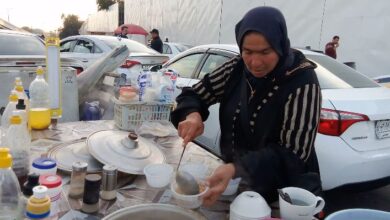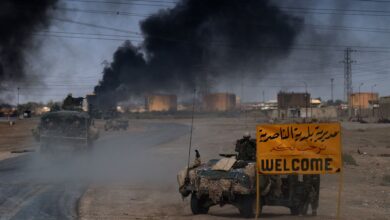NON-TRADITIONAL DOMESTIC VIOLENCE: A spate of murders, where wives killed their husbands, makes headlines in Nasiriyah

On the last day of his life, Firas Shalaan’s relationship with his wife seemed completely normal. The couple had gone out for a stroll along the streets of the southern city in which they lived, Nasiriyah. It was Ramadan and the evening atmosphere, after families broke their daytime fast, was festive.
By Zakaria Ali
Then the couple returned home where Shalaan’s wife gave him a sleeping pill. Two hours later he awoke in the middle of a terrifying fire.
There was nowhere for him to hide – he tried to get into the refrigerator – and the 41-year-old, who was finally rescued by neighbours, eventually died of his wounds in hospital.
The police are still hunting for his wife, who is accused of spraying the room with flammable liquids, setting them alight and then locking all the doors.
The couple had been married for 15 years but had never managed to have any children. This was why a few days before the fire, Shalaan had decided to take a second wife.
This wasn’t the first recent incident of female-on-male domestic violence in Nasiriyah. In early January, a well-known local lawyer Ali al-Hamami was found dead, tied to a chair with a blue plastic bag over his head.
His wife eventually confessed to plotting with her Baghdad-based lover to killing the lawyer.
Of course, most cases of domestic violence are still overwhelmingly male-on-female. Official statistics suggest that, between January 2020 and November 2020, Dhi Qar province – Nasiriyah is its capital – recorded 1,468 cases of domestic violence.
Of these, 1,038 consisted of husbands committing offences against their wives. Only 215 saw wives committing offences against their husbands. The rest of the incidents involved children beating parents or siblings fighting.
According to a source working for the local police, numbers have increased significantly during the pandemic too.
“Violence is dominant in the culture here,” argues local sociologist Mohammad al-Aboudi. He believes this is due to the fact that Iraq itself has had such a violent history. “These things become entrenched,” he notes. “And then there is also tribal violence that uses a weaponized language, the influence of social media and other programs that promote crime.”
It is not clear whether the friends of murder victim Firas Shalaan would agree with that. Two weeks after he was killed, his friends and colleagues gathered outside his home, which was still under lock and key.
They placed his picture on the doorstep and lit candles for him. The only sound was that of people crying.




